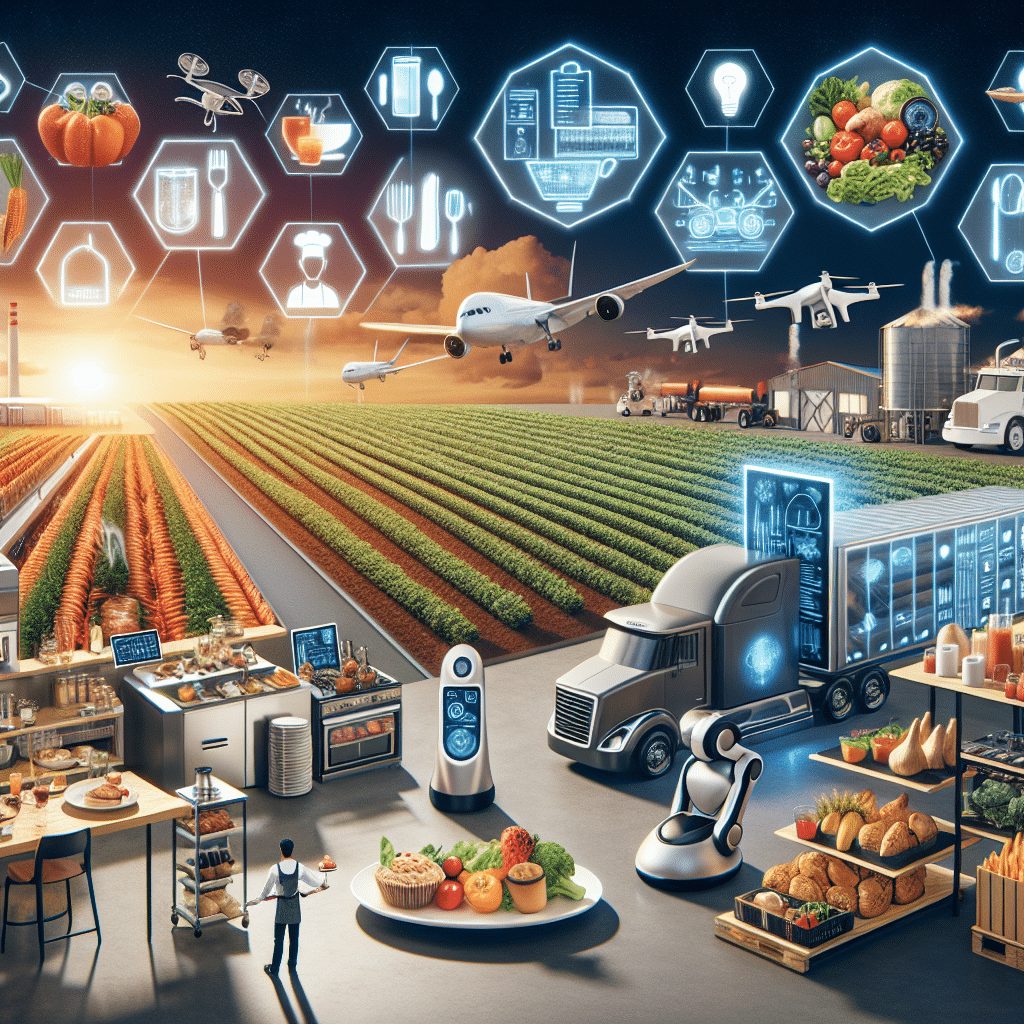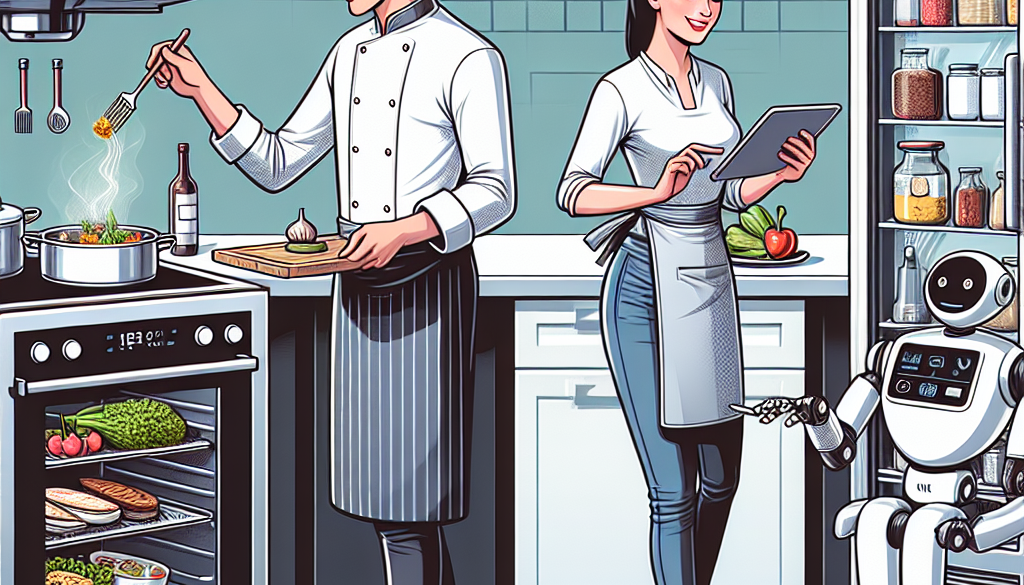What changes are occurring in the food and beverage industry due to modern technology?
-
Table of Contents
- Modern Technology Revolutionizing the Food and Beverage Industry
- Automation and Robotics in Manufacturing
- Artificial Intelligence and Big Data Analytics
- Blockchain for Traceability and Transparency
- Internet of Things (IoT) Enhancing Operations
- 3D Food Printing and Customization
- Mobile and E-commerce Platforms
- Conclusion
- Discover ETprotein’s Advanced Protein Products
Modern Technology Revolutionizing the Food and Beverage Industry

The food and beverage industry is undergoing a significant transformation, thanks to the advent of modern technology. From production to distribution, and consumption, every facet of the industry is being reshaped by innovative tech solutions. This article explores the various changes occurring in the food and beverage sector due to technological advancements, providing insights into how these changes are improving efficiency, sustainability, and consumer experiences.
Automation and Robotics in Manufacturing
One of the most significant changes in the food and beverage industry is the increased use of automation and robotics. These technologies are streamlining production processes, reducing labor costs, and enhancing safety. For instance:
- Robotic arms are now used for tasks like packaging, sorting, and handling of food products.
- Automated systems monitor and control environmental conditions, ensuring optimal product quality.
- Advanced machinery is capable of performing complex tasks such as butchering, baking, and cooking with precision and consistency.
Statistics show that the global food robotics market is expected to reach USD 3.1 billion by 2025, growing at a CAGR of 13.0% from 2020 to 2025.
Artificial Intelligence and Big Data Analytics
Artificial Intelligence (AI) and big data analytics are playing a crucial role in understanding consumer behavior, optimizing supply chains, and predicting market trends. These technologies enable:
- Personalized marketing strategies based on consumer data analysis.
- Efficient inventory management through predictive analytics, reducing waste and shortages.
- AI-powered quality control systems that detect defects and contaminants in real-time.
According to a report by MarketsandMarkets, the AI in the food and beverage market is projected to grow from USD 3.0 billion in 2020 to USD 29.94 billion by 2026, at a CAGR of 45.77% during the forecast period.
Blockchain for Traceability and Transparency
Blockchain technology is enhancing traceability and transparency in the food supply chain. By creating a secure and immutable ledger of transactions, blockchain allows:
- Consumers to trace the origin and journey of food products from farm to table.
- Manufacturers to quickly identify and address sources of contamination during food recalls.
- Stakeholders to ensure compliance with ethical sourcing and sustainability standards.
Research by Gartner predicts that by 2025, 20% of the top 10 global grocers will use blockchain for food safety and traceability to create visibility to production, quality, and freshness.
Internet of Things (IoT) Enhancing Operations
The Internet of Things (IoT) is connecting various devices and systems within the food and beverage industry, leading to smarter operations. IoT applications include:
- Smart sensors that monitor storage conditions and automatically adjust temperature and humidity levels.
- Connected machinery that provides real-time data on performance and maintenance needs.
- Wearable technology for employees that enhances safety and productivity.
Statista reports that the global IoT in the food and beverage market is expected to reach approximately USD 13.5 billion by 2026.
3D Food Printing and Customization
3D food printing is opening up new possibilities for customization and on-demand production. This technology allows:
- Creation of complex food shapes and structures that are not possible with traditional methods.
- Personalized nutrition where meals are tailored to individual dietary requirements.
- Reduction in food waste by using precise amounts of ingredients.
As per a report by Research and Markets, the global 3D food printing market is anticipated to grow at a CAGR of 54.75% during the forecast period 2019-2025.
Mobile and E-commerce Platforms
The rise of mobile and e-commerce platforms has changed how consumers purchase food and beverages. These platforms offer:
- Convenience with online ordering and home delivery services.
- Access to a wider range of products, including international and niche items.
- Opportunities for small producers to reach a global audience.
According to eMarketer, food and beverage is the fastest-growing e-commerce category, with sales expected to grow to $38 billion in 2023 from $23 billion in 2018.
Conclusion
The food and beverage industry is experiencing a technological renaissance that is reshaping its future. Automation and robotics are increasing production efficiency, while AI and big data analytics provide valuable consumer insights. Blockchain technology ensures traceability and transparency, IoT optimizes operations, and 3D food printing offers unprecedented customization. Lastly, mobile and e-commerce platforms are revolutionizing the way consumers interact with food brands. These advancements not only enhance business operations but also cater to the evolving demands of consumers for quality, convenience, and sustainability.
Discover ETprotein’s Advanced Protein Products
In line with the technological advancements in the food and beverage industry, ETprotein is at the forefront of providing high-quality protein products. Their extensive range of organic bulk vegan proteins and L-(+)-Ergothioneine (EGT) caters to the needs of various industries, including nutraceuticals, pharmaceuticals, and food and beverage. With a commitment to non-GMO, allergen-free products with high purity levels, ETprotein is an ideal partner for businesses looking to innovate and excel in today’s competitive market.
About ETprotein:
ETprotein, a reputable protein and L-(+)-Ergothioneine (EGT) Chinese factory manufacturer and supplier, is renowned for producing, stocking, exporting, and delivering the highest quality organic bulk vegan proteins and L-(+)-Ergothioneine. They include Organic rice protein, clear rice protein, pea protein, clear pea protein, watermelon seed protein, pumpkin seed protein, sunflower seed protein, mung bean protein, peanut protein, and L-(+)-Ergothioneine EGT Pharmaceutical grade, L-(+)-Ergothioneine EGT food grade, L-(+)-Ergothioneine EGT cosmetic grade, L-(+)-Ergothioneine EGT reference grade and L-(+)-Ergothioneine EGT standard. Their offerings, characterized by a neutral taste, non-GMO, allergen-free attributes, with L-(+)-Ergothioneine purity over 98%, 99%, cater to a diverse range of industries. They serve nutraceutical, pharmaceutical, cosmeceutical, veterinary, as well as food and beverage finished product distributors, traders, and manufacturers across Europe, USA, Canada, Australia, Thailand, Japan, Korea, Brazil, and Chile, among others.
ETprotein specialization includes exporting and delivering tailor-made protein powder and finished nutritional supplements. Their extensive product range covers sectors like Food and Beverage, Sports Nutrition, Weight Management, Dietary Supplements, Health and Wellness Products, and Infant Formula, ensuring comprehensive solutions to meet all your protein needs.
As a trusted company by leading global food and beverage brands and Fortune 500 companies, ETprotein reinforces China’s reputation in the global arena. For more information or to sample their products, please contact them and email sales(at)ETprotein.com today.












